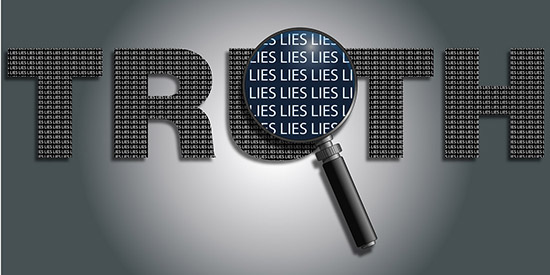Is the politics of lying the slippery slope to a post-truth society?
Media releaseDespite the recent attention placed on public figures playing loose with the truth, the seeming increase in lying does not necessarily mean we are living in a post-truth society - at least not yet according to Deakin University philosophy expert Associate Professor Matthew Sharpe.
“Whatever fake news is put out and however much governments mislead or deceive their constituents, the role of the media in pluralistic democracies remains to stave off the slide into a post-truth society and play its fundamental democratic role in truthfully informing the citizens and holding politicians to account,” said Associate Professor Sharpe, a philosophy researcher with Deakin’s Alfred Deakin Institute for Citizenship and Globalisation.
Politicians have for a long time had a reputation for being loose with the truth, Associate Professor Sharpe explained.
“The ‘noble lie’ was a political term coined by the ancient Greek philosopher Plato,” he said.
“While the ancient art of rhetoric teaches techniques for political speakers to present unfavourable things in a favourable light, avoiding or downplaying unpleasant facts, and exaggerating the truth for political effect.”
Donald Trump’s behaviour has, and continues to, focus the public eye on the art of the political lie, with his road to the Whitehouse paved with many lies and ‘alternative facts’ - one fact-check reported that 70 per cent of Trump’s statements during his campaign were false.
“There is something exceptional about Donald Trump’s rise to power in this connection to lying,” Associate Professor Sharpe said.
“The whole thing began, long before the ‘beautiful wall’ and the ‘Mexican rapists’, by his spruiking the ‘birther’ deception that President Obama was not born in the USA.
“The lies and false rumours have not stopped since, including the disputes surrounding how many people attended and watched the Inauguration.
“The French resistance author Albert Camus wrote ‘Fascism is an act of contempt. Inversely, every form of contempt, if it intervenes in politics, prepares or sets up fascism...’
“The deep worry is that Mr Trump and his team seems to have a contempt for the need to tell the truth to the people he claims to directly embody, and to shoot the messengers of competing accounts.”
Associate Professor Sharpe said that prevalence of lies and fake news could be the slippery slope to a post truth society.
“There is another real concern here, that the increasing circulation of fake news will dishearten the citizenry, who will ask themselves: ‘who knows if it is true or not? We can’t say’, and cease to hold politicians to account for their claims and promises,” he said.
“At that point, truths and lies will both fade into irrelevance: all that are left are perspectives or, per Mr Trump’s Press team this week, ‘alternative facts’.
“The electoral system, and the checks-and-balances of democratic societies are meant to place a check on the mendacity of people in office.
“Mr Trump flirts with preferring to lie in order to appear “authentic” and unafraid to say what others don’t, as against accepting the necessity to temper political action with compromise, politically, and the facts, realistically.”
Share this story

